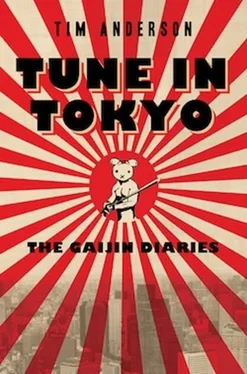After chatting to the Ex-Girl girls until our Japanese and their English completely give out, we get some more beers and rejoin the others for a boogie. As we all dance and swig and chatter, I find myself thinking about what I’ve learned on my Japan odyssey. A cloyingly American thing to do, but I am what I am, and I’ve got to tie this shit up somehow.
I’ve learned that sometimes assuming does indeed make an ass out of you and me. When I’d first started teaching and asked my students what they eat for breakfast, many of them had replied, “Rice and miso soup.” I’d foolishly assumed that this meant they ate them together in the same bowl, like we Americans do with dishes like macaroni and cheese or Corn Flakes and ice cream. This is not so, as I found out when eating lunch with Shunsuke one day. He saw me empty my rice into my bowl of miso soup, looked around uncomfortably, making sure the waitress and surrounding customers were minding their own damn business, and said to me, “That like cat food. But it’s OK, you are foreigner.”
Or the time when I wanted to send a Japanese card home to the folks and had bought one at the convenience store, assuming it was an all-purpose card. When I brought it home, Akiko told me it was a card intended for a person whose family member has recently died. I sent it to my folks anyway, telling them that the Japanese translated roughly to, “Happy Earth Day.”
But I am tired of teaching. My mojo in the classroom never fully returned, and I’ve taken that as a sign that I’m meant to move on to something else, something that involves a little less of what some gaijinfolk call Japanger:
juh-pan´-gur, n.: the overwhelming feeling of frustration and displeasure, usually of Western people living in Japan, resulting from doing daily battle with the sometimes maddening idiosyncrasies and inscrutable behaviors of the Japanese people
But I will miss those many moments when I could actually feel my students reaching out to me from the dark corners of the language barrier and communicate from their heart. I asked an advanced class one time to write me a short essay about a person they admire. Most of the students conveniently forgot to do the assignment and simply avoided my classes for a few weeks until they were satisfied that I’d forgotten. One student, a university female, wrote one sentence: “I most admire my cat because her life is so easy.” Not really what I was looking for, but at least she’d turned something in. Then, one day a few weeks later, I found a neatly typed essay from Masahiro, a retired banker, on the top of my stack of papers to grade.
The Person I Most Admire
As well as my father, I admire my mother the most. During the WWII, our family was living in the northeastern part of China, then called Manchuria. I was born in Shenyang in 1943, and my younger brother in Pyongyang in 1945. My father was from Hokkaido and began working for Manchurian Railroad right after his graduation from a college in Shanghai. My mother, born in Tokyo, married him through an arranged meeting in Tokyo held only once a little before the WWII took place, and left for Manchuria.
Despite of their dream of having better days as a railroad officer when the war ends, my father, like all of Japanese and Manchurian Japanese citizens, was aware that Japan would be defeated by the Allies. And the day came. Our family had to stay in Manchuria but live separately, as he was ordered to take care of Japanese pioneers, who mostly came to this continent to develop lands and engage in agriculture, and merchants to return home in Japan safely. My mother and I fled to north part of Korea, where my younger brother was born. It took him more than a year to get together with his wife and sons.
I was two to three years old then, but I can imagine that she took me on her back and fled to Pyongyang. Soon after the birth of my brother we returned to Manchuria, where father was waiting for us. It was already the time when Manchurian Railroad was no longer operative, and we still had attacks from the Chinese army, robbery by Siberian soldiers, and so forth, though the war had really ended in Japan. My parents often took me to the railway area to pick up coals spilt from trains. Those gathered coals could sell and helped our living.
Years passed since we came back to my mother’s birthplace, Tokyo. She was so strong physically and mentally like many of other Japanese women at that time that we could be safely flee to anywhere. I admire her power and high spirit to return home, as I learned how tough days they spent. More words would be necessary to describe what troubles and accidents they met if space allows. My father died of cancer 26 years ago and 28 years after we got on board an American frigate leaving for Sasebo from China.
A devastating and lovingly told story. I was full of awe and wonder at the brutal odyssey of Masahiro’s life, his honesty, and his skill in retelling it in a language that was not his own. Since I felt that correcting his grammar was completely pointless and, in fact, rude, I simply wrote, “Thank you, Masahiro, what an amazing story,” made a copy of it for my scrapbook, and placed it in the graded pile.
Feeling quite overwhelmed, I picked up the next piece of homework with a sigh and saw that it was from Tomoyuki, the young J. D. Salinger freak. His assignment was to list one thing he thinks should be banned and explain why:
Getting on the train in a drunken stupor should be banned. Have you ever taken the Yokosuka Line at night? It’s quite terrible. There are a lot of fucked up sons of bitches on the train, tarzans spitting, swaying, etc. Most of them have terrible breath. Some guys throw up on the floor, others begin to fight out loud. It’s extremely noisy and stinky in the train. To make matters worse, whenever they make trouble with other sober passengers, the police don’t punish them strictly. Japan is a paradise for drunks.
In a word: poignant.
Best of all was the dialogue turned in by Yohichi the movie cameraman, an intermediate student. The assignment was to write a short dialogue in which two people are deciding what to do for the evening, and there must be at least one conflict involved. Yohichi’s conversation went like this:
A: What do you want to do tonight?
B: I don’t know.
A: How about marijuana? It’s very fun.
B: But it’s not lawfulness. I don’t want to go jail. How about mushrooms instead? It’s lawfulness.
A: Sounds great!
Was he listening in on the conversation Rachel and I were having the other night in the lobby? Plagiarist.
In so many ways, Japan is America on Opposite Day, which is what has kept my eyes popping open every morning for the past two years, eager to see what absurdities it would bear witness to in the next sixteen hours. It’s not just that Japanese verbs come at the end of Japanese sentences. It’s in our very essence that we Westerners feel like we’re peeping into the otherworld of the looking glass when we stare into the eyes of a Japanese face. Where in America we tend to go to the movies and have conversations with the movie screen, a Japanese cinema, no matter how funny or exciting the film, is as still and reverential as a Shinto shrine. A good-looking draft beer in America will have at most an inch of foam at the top, and if there’s more, we will ask for it to be topped off. Here, if your draft beer comes with less than a quarter of the glass full of creamy, bubbly, delicious foam, the customer will think the beer is old and stale and might ask for a new one. If someone compliments your spouse, saying something like, “Oh, your wife is a great cook,” it is customary in America to say, “Yeah, isn’t she great? How about that bean dip, huh?” and then perhaps slap her on the butt affectionately. But in Japan, it is considered proper to reply with an insult, like, “Oh, that silly bitch couldn’t cook her way out of a to-go box. That shit was take-out.” Something like that.
Читать дальше












